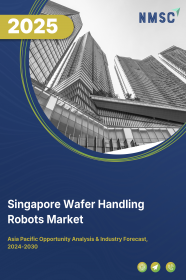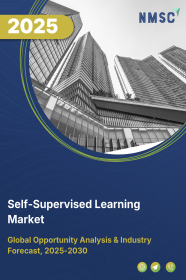
Singapore Wafer Handling Robots Market by Product Type (Vacuum Wafer Handling Robots and Atmospheric Wafer Handling Robots), by Number of Arms (Single Arm and Dual Arm), by Robot Type (Linear Robots, SCARA Robots, Articulated Robots, Cylindrical Robot, and Others), by Operation (Motor Driven and Belt Driven), by Installation (Free Standing and Integrated), by End Use (Integrated Device Manufacturer (IDM) and Foundries) –Opportunity Analysis and Industry Forecast, 2024–2030
Industry: ICT & Media | Publish Date: 15-Feb-2025 | No of Pages: 169 | No. of Tables: 132 | No. of Figures: 97 | Format: PDF | Report Code : IC2092
US Tariff Impact on Singapore Wafer Handling Robots Market
Trump Tariffs Are Reshaping Global Business
Singapore Wafer Handling Robots Market Overview
The Singapore Wafer Handling Robots Market size was valued at USD 128.5 million in 2023, and is predicted to reach USD 259.5 million by 2030, at a CAGR of 9.8% from 2024 to 2030. Also, the market size was 4104.0 units in 2023, and is predicted to reach 11628.0 units by 2030, with a CAGR of 15.1% from 2024 to 2030.
A wafer handling robot represents a specialized robotic solution designed to streamline the complex procedures inherent in semiconductor manufacturing. These robots demonstrate exceptional proficiency in executing precise movements and positioning tasks with fragile semiconductor wafers. Their significance lies in their pivotal role in the creation of top-tier integrated circuits and microelectronic devices.
Operating within pristine cleanroom environments, they incorporate a diverse range of end effectors, sensors, and vision systems to securely grasp, inspect, and manipulate wafers, all while mitigating the risks of damage or contamination. By seamlessly integrating with other fabrication equipment, these robots not only boost operational efficiency and minimize errors but also foster the consistent production of cutting-edge semiconductor technologies that power an extensive array of contemporary devices.
Establishment of Advanced Semiconductor Laboratories Propel the Singapore Wafer Handling Robots Market Growth
The establishment of new semiconductor laboratories and manufacturing facilities, exemplified by initiatives like the advanced semiconductor packaging lab launched by Silicon Box in Singapore, significantly drives the demand for wafer handling robots.
In July 2023, Silicon Box, a semiconductor startup, announced a substantial investment of $2 billion to introduce cutting-edge chip packaging technology. The primary objectives of this advanced semiconductor packaging lab are to revolutionize chip manufacturing processes, foster local semiconductor capabilities, and elevate Singapore's global standing as a prominent hub for semiconductor manufacturing.
Growing Support from Singapore Economic Development Board Boost the Wafer Handling Robots Market Growth
The Singapore Economic Development Board (EDB) actively supports projects like Silicon Box's advanced semiconductor packaging lab, emphasizing the strategic importance of regional semiconductor manufacturing and the role of automation technologies, including wafer robots, in facilitating this growth.
By encouraging investments in semiconductor research and development, as well as manufacturing infrastructure, the EDB aims to enhance Singapore's competitiveness in the global semiconductor market. The support from governmental agencies underscores the significance of automation solutions, such as wafer handling robots, in driving innovation and efficiency in semiconductor manufacturing processes, thus fuelling the demand for these technologies in Singapore's semiconductor industry.
High Initial Cost Restrains the Wafer Handling Robots Market Growth in Singapore
The significant cost linked with wafer handling robots presents a formidable obstacle to market growth. The initial investment required for acquiring, integrating, and maintaining these sophisticated automation systems poses a substantial financial burden for companies, especially those operating within limited budgets. This financial constraint has the potential to deter potential adopters from entering the market or expanding their automation capabilities.
Incorporation of Advanced Technologies such as Computer Vision and AI to Enhance Precision
Incorporating advanced technologies such as Artificial Intelligence (AI), computer vision, and the Internet of Things (IoT) into robots provides significant opportunities for market expansion.
These integrations empower wafer handling robots to optimize processes, enhance operational efficiency, and enable predictive maintenance. AI algorithms play a key role in refining robot movements, improving quality control by identifying defects in real-time, and predicting maintenance needs.
Computer vision ensures precise handling of wafers and accurate object recognition, even in complex operational environments, while IoT connectivity allows for real-time monitoring, data exchange, and predictive maintenance, thereby reducing downtime.
Additionally, the integration of advanced safety features, data analytics capabilities, and advancements in energy efficiency further emphasize the vital role of wafer handling robots as essential assets in the ever-evolving semiconductor manufacturing industry.
Competitive Landscape
Singapore wafer handling robots industry comprises various market players, such as include Kawasaki Heavy Industries, Ltd., Nidec Instruments Corporation, Yaskawa Electric Corp., RORZE Corporation, DAIHEN Corporation, Hirata Corporation, Rexxam Co., Ltd., KUKA AG, ULVAC, Inc., and Stäubli International AG.
Singapore Wafer Handling Robots Market Key Segments
By Product Type
-
Vacuum Wafer Handling Robots
-
Atmospheric Wafer Handling Robots
By Number of Arms
-
Single Arm
-
Dual Arm
By Robot Type
-
Linear Robots
-
SCARA Robots
-
Articulated Robots
-
Cylindrical Robot
-
Others
By Operation
-
Motor Driven
-
Belt Driven
-
Stainless Steel Belts
-
Rubber Belts
-
Polymer Belts
-
By Installation
-
Free Standing
-
Integrated
By Wafer Size
-
Up to 100 mm
-
150 mm
-
200 mm
-
300 mm
-
Above 300 mm
By Semiconductor Process
-
Oxidation (Deposition)
-
Lithography
-
Etching, Cleaning, Polishing
-
Inspection & Testing
-
Assembly & Packaging
By End Use
-
Integrated Device Manufacturer (IDM)
-
Foundries
REPORT SCOPE AND SEGMENTATION:
|
Parameters |
Details |
|
Market Size in 2023 |
USD 128.5 Million |
|
Revenue Forecast in 2030 |
USD 259.5 Million |
|
Growth Rate |
CAGR of 9.8% from 2024 to 2030 |
|
Market Volumes in 2023 (units) |
4104.0 |
|
Volumes Forecast in 2030 (units) |
11628.0 |
|
Growth Rate |
15.1% |
|
Analysis Period |
2023–2030 |
|
Base Year Considered |
2023 |
|
Forecast Period |
2024–2030 |
|
Market Size Estimation |
Million (USD) |
|
Growth Factors |
|
|
Companies Profiled |
10 |
|
Market Share |
Available for 10 companies |
|
Customization Scope |
Free customization (equivalent up to 80 working hours of analysts) after purchase. Addition or alteration to country, regional, and segment scope. |
|
Pricing and Purchase Options |
Avail customized purchase options to meet your exact research needs. |
KEY PLAYERS
-
Kawasaki Heavy Industries, Ltd.
-
Nidec Instruments Corporation
-
Yaskawa Electric Corp.
-
RORZE Corporation
-
DAIHEN Corporation
-
Hirata Corporation
-
Rexxam Co., Ltd.
-
KUKA AG
-
ULVAC, Inc.
-
Stäubli International AG

















 Speak to Our Analyst
Speak to Our Analyst





















